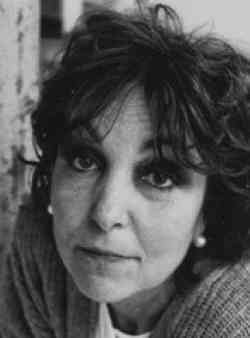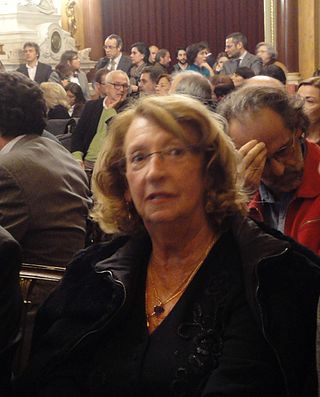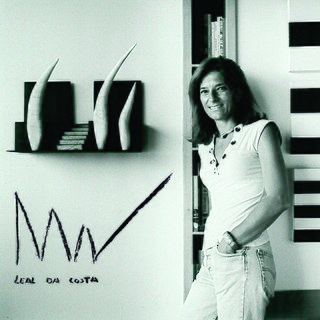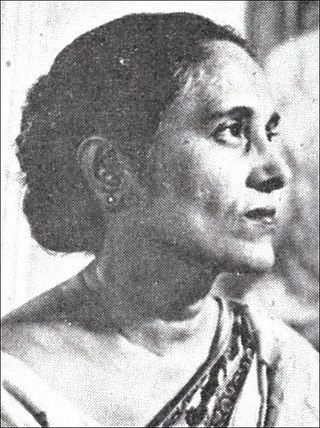
Dame Maria Paula Figueiroa Rego was a Portuguese visual artist, widely considered the pre-eminent woman artist of the late 20th and early 21st century, known particularly for her paintings and prints based on storybooks. Rego's style evolved from abstract towards representational, and she favoured pastels over oils for much of her career. Her work often reflects feminism, coloured by folk-themes from her native Portugal.

Serralves is a cultural institution located in Porto, Portugal. It includes a contemporary art museum, a park, and a villa, with each one of these being an example of contemporary architecture, Modernism, and Art Deco architecture. The museum, designed by Álvaro Siza Vieira, is now the second most visited museum in Portugal.

Albuquerque Mendes is a Portuguese artist. He works in the fields of painting, performance art and installation.

Gretta Sarfaty, born Alegre Sarfaty, is also known as Gretta Grzywacz and Greta Sarfaty Marchant, also simply as Gretta. is a painter, photographer and multimedia artist who earned international acclaim in the 1970s, from her artistic works related to Body art and Feminism. Born in Greece, in 1947, she moved with her family to São Paulo in 1954, being naturalized as Brazilian.
Francisco Laranjo was a Portuguese contemporary painter and educator.

The Ema Gordon Klabin Cultural Foundation is an art museum located in the city of São Paulo, Brazil. Officially established in 1978, it is a not-for-profit private institution, legally declared as an organization of federal public interest. It was created by the Brazilian collector and philanthropist Ema Gordon Klabin (1907–1994), with the purpose of preserving and displaying her art collection, as well as promoting cultural, artistic and scientific activities. The foundation is headquartered in Ema's former house in Jardins district, specially designed by architect Alfredo Ernesto Becker in the 1950s to hold her collection. The house is surrounded by a 4,000 square meters garden projected by Brazilian landscape architect Roberto Burle Marx.

Filipa César is an artist and filmmaker. She lives and works in Berlin, and studied at the Faculty of Arts in Porto and Lisbon (1996–99), the Academy of Arts in Munich (1999–2000) and MA Art in Context, University of Arts, Berlin (2007). Since April 2021 César is professor at Merz Akademie Stuttgart, Germany.
Menez or Maria Inês Ribeiro da Fonseca, GOSE was a Portuguese painter. Her major body of work consists of paintings and drawings but she also produced ceramics, engravings, silk-screen prints and tapestries.
Sofia Areal is a Portuguese abstract painter, whose works adhere mostly to organic non-geometrical forms and a strong chromatic focus. Besides painting and drawing, Areal's work involves collage, textile design, and scenography.

Helena AlmeidaGOIH was a Portuguese artist known for her work in photography, performance art, body art, painting and drawing.
Alberto Carneiro was a Portuguese artist.

Francisco Tropa is a Portuguese sculptor and visual artist. He lives and works in Lisbon.

Maria Ana de Sousa Leal da Costa, is a Portuguese sculptor.
Lucia Nogueira (1950–1998) was a Brazilian artist specialising in sculptures and installations, video works and drawings. Her work often alluded to the body and was concerned with the relationship between objects and language.

Angela Trindade was an Indian painter famous for her Western-style portraits and Christian paintings in the Indian style. As a versatile artist, she also developed her own style called Trindadism, in which she incorporated the symbolic dimensions of the triangle and the trinity. This unique approach to art allowed Trindade to establish her individuality as an artist.
Susanne S. D. Themlitz is an installation artist who has Portuguese and German nationality. She has exhibited widely in Portugal, Germany and Spain.
Carlos Bunga is a Portuguese artist known for his installations out of mass-produced materials, like cardboard, duct tape and home paint, questioning architecture as a language of power and other inertias related to it, like order and solidity.
Isabel Lhano was a Portuguese artist. She fought against the Estado Novo and was arrested by PIDE for distributing leaflets against the Portuguese Colonial War. She was one of the founders of women's organization UMAR.
Maria Capelo is a Portuguese artist who paints mainly landscapes with Indian ink. She was the unanimous winner among the judges of the FLAD Drawing Prize in 2022.











